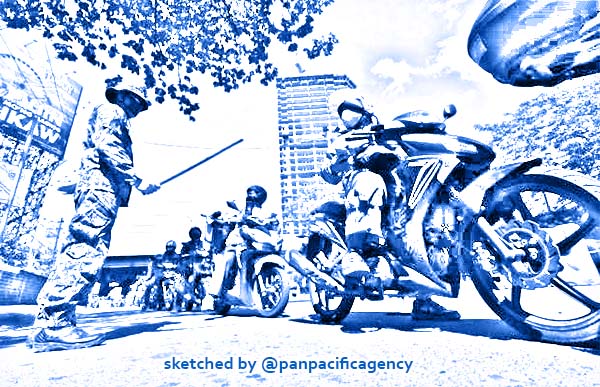Quarantine in the Philippine capital Manila could extended till December: Officials

Police checkpoints will remain at borders between cities and towns even if the enhanced community quarantine is lifted and the less restrictive general community quarantine is implemented in several areas of Metro Manila after May 15. (Photo by NIÑO JESUS ORBETA / Philippine Daily Inquirer). Sketched by the Pan Pacific Agency.
MANILA, Oct 20, 2020, The Manila Times. The Inter-Agency Task Force for the Management of Emerging Infectious Diseases (IATF-EID) is studying the possibility of extending the general community quarantine (GCQ) in Metro Manila until December, The Manila Times reported.
In a press briefing on Monday, Palace spokesman Harry Roque Jr. said the task force members reached the consensus to extend the GCQ in Metro Manila, which would be in effect until October 31.
Roque said the task force was looking at initial data before deciding on the quarantine classification for Metro Manila, the epicenter of the coronavirus disease 2019 (Covid-19) pandemic in the country, after October.
Metro Manila Development Authority General Manager Jose Arturo Garcia Jr. had announced that the Metro Manila Council recommended such an extension to the IATF-EID.
Roque said it was also possible that Metro Manila could shift to the most lenient modified GCQ, noting the decline in Covid-19 cases in the region.
He stressed that under any quarantine, the health protocols such as wearing face masks and face shields would be enforced.
He said what was being implemented in Metro Manila is a relaxed GCQ, which allows more people to go out of their homes and businesses to reopen.
“Hindi pupuwedeng magtago tayo sa kweba habang may Covid-19 tulad ng gusto ng ilan (We cannot hide forever in our homes because of Covid-19, which is what some people are espousing),” Roque said.
Aside from the recommendation to extend the GCQ, the council also agreed to shorten the curfew hours in Metro Manila from 10 p.m. to 5 a.m., to 12 a.m. to 4 a.m.
The council, made up of the region’s local chief executives, also agreed to allow persons aged 18 to 65 years old to leave their houses, and to increase capacity in churches up to 30 percent.
Roque said it was the prerogative of local chief executives to shorten the curfew and ease age restrictions even without seeking approval from the IATF-EID.
The IATF-EID, however, has to decide on whether to heed the recommendation of the MMC to raise the capacity of churches to 30 percent, he said.